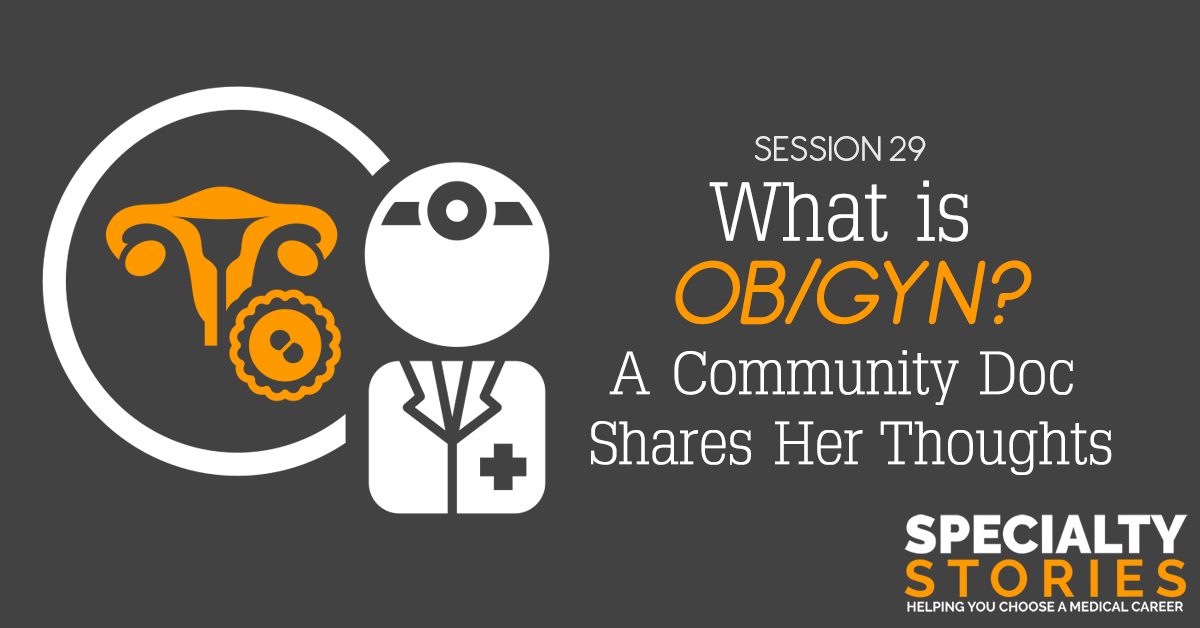Apple Podcasts | Google Podcasts

Session 29
Dr. Renée Darko is a community-based OB/GYN. In our podcast, she talked about her path to OB, what you should be thinking about during med school, and some tips as you’re going through the process of deciding whether OB/GYN is right for you. If you haven’t yet, please listen to Episode 127, I dove into the residency match data for OB/GYN.
[01:30] Community Setting Practice
Renée practices in a community setting. Although at one point, she considered an academic setting while she was in residency but shortly before she graduated from residency, she started realizing that she needed to explore a little bit more of the setting she wanted to be in so she began doing Locum Tenens in terms of practice rather than joining a group or an academic center. During the time she was doing Locum right after she graduated from residency, she also did a Health Policy Fellowship to give her a little bit of time to think of what she wanted to be and what she wanted to do. Renée graduated from her residency in 2010 so she has been practicing for seven years now.
[02:44] An Interest in Pediatrics to OB/GYN
Renée did not want to be an OB/GYN when she first entered medical school. In fact, she says it was the last thing she ever wanted to do. She actually wanted to be a pediatrician. The she did her pediatric rotation in her third year of medical school and she hated it, not because of the kids or the parents, but she just didn’t enjoy the medicine of pediatrics and realized it wasn’t for her.
During the last rotation of her third year was OB/GYN and knowing it was the last rotation and knowing she wasn’t going to like it, she thought she didn’t know what to do. But upon her first week of OB, she absolutely loved it. She loves the versatility of it as well as going to the OR, doing the deliveries, and doing the procedures in the office. She then realized considering an OB/GYN more seriously.
Renée’s experience in pediatrics was somewhat a repetitive cycle which she didn’t like. She didn’t enjoy it because she didn’t think she was very good at it mainly because it didn’t interest her. Whereas she found OB to be a lot more versatile even as a generalist. They were doing things that could be potentially considered as subspecialties like surgery. She basically likes the fact that she can work with her hands and do a bit more to keep herself busy.
Before she started her path to OB/GYN, Renée had not considered a procedure-based practice. She never really thought about the procedures being a major part of what she would be doing as a physician. She thought that if she liked a particular population, being a new mom and that she loves kids, then that’s the population she wants to work with. She realized she needed more than just the population. She needed something that was going to motivate her, keep her busy, and something that she was going to enjoy. So to her, the practice of OB/GYN was just of more interest to her. This is another example of keeping an open mind going into medical school.
[Tweet “I needed more than just the population. I needed something that was going to motivate me and keep me busy. https://medicalschoolhq.net/ss-29-what-is-obgyn-a-community-doc-shares-her-thoughts/”]
[07:15] Traits that Lead to Becoming a Great OB/GYN
One trait that leads to becoming a great OB/GYN is being a good listener and allowing the patients to feel comfortable with you. When Renée was in residency, one of the things her attending used to say to her is that you’re not your patient’s social worker. Part of the reason she was being told that is because she would go in doing more than just prescription or procedure. She would actually sit down and listen to patients as they tell her their lives and all things that affect people outside of just looking at their differential diagnosis. Hence, Renée recommends thinking about the things affecting your patient’s health. She adds this is a very intimate type of specialty so you need to go in thinking that and realizing that the patient is going to tell you intimate details and for you not to shy away from listening to those details otherwise you might miss things.
[Tweet “You really need to think about what are the things that are affecting your patient’s health. https://medicalschoolhq.net/ss-29-what-is-obgyn-a-community-doc-shares-her-thoughts/”]
[Tweet “You need to go in thinking that and realizing that the patient is going to tell you intimate details https://medicalschoolhq.net/ss-29-what-is-obgyn-a-community-doc-shares-her-thoughts/”]
[09:22] Keeping an Open Mind
Renée was so dead-locked on being a pediatrician that she didn’t let herself open to looking at other specialties. Apparently, she was so hooked to pediatrics until their peds rotation when she realized she didn’t like it. Again, it was only till the end of his third year that she did an OB rotation so she felt she missed a lot of other opportunities and that she should have considered other specialties. That said, Renée loves OB/GYN and she says she wouldn’t trade it for the world.
[10:25] Types of Patients and Typical Day
As an OB/GYN, you deal with patients on the OB (obstetrics) side composed of pregnant patients and the Gynecology side consisting of non-pregnant patients ranging from teens to the elderly. Aside from pregnant patients, she also sees patients trying to conceive, those with fertility issues, menstruation issues as well as women going through menopause. Basically, she sees a wide variety of patients and this is what makes her job more interesting instead of just one diagnosis she sees constantly throughout the day.
[Tweet “I see a wide variety of patients… there’s not just one diagnosis I’m seeing constantly throughout the day. https://medicalschoolhq.net/ss-29-what-is-obgyn-a-community-doc-shares-her-thoughts/”]
Renée’s typical day would be going into the office at around 8:45 and sees about 10-12 patients in the morning and around the same thing in the afternoon. The first patient may be a pregnant patient and if it’s her first visit, she has to assess all of her risk factors – her age, previous pregnancies and/or complications, genetic disorders (including the father), medical conditions. The she does an exam on her to make sure she’s doing okay and measure the size of her uterus. If she’s far enough along, Renée can listen to the baby’s heartbeat. Then they make a plan as to how the pregnancy is going to go, things to expect, follow-up appointment, and what to expect for next time. Every patient may be a different diagnosis and coming for a different problem. The next patient may be an elderly woman having the hot flushes. So her patients vary everyday in terms of the number and versatility of patients she sees.
[13:58] Taking Calls
For Renée, she doesn’t take a lot of calls although previously, she had to take calls three to four times a week which can get pretty hectic. Basically, the number of calls you take as an OB/GYN depends on how many people you have in your call rotation. Calls vary as well in that there are different models of OB. One of the more popular ones is the Laborist model where you’re in the hospital and that’s all you do so you typically won’t see patients in the office. Renée didn’t practice this in the past.
However, if you see patients in the office and take calls at night, you can either take call from home if you live close enough. You can take call in the hospital where you have to stay in the hospital overnight or you can take call from home and do something called second call, the most recent kind of call she has taken, which Renée describes as when someone else is taking the primary call.
For example, the family practice doctors who practice OB (common in a rural setting) are the first line of call so they take care most of the pregnant patients that come in. But if they ran into a problem such as a complication or the patient is more high risk than they anticipated or if the patient needs a C-section, she will then be called and she will come in from home into the hospital.
[16:40] Work-Life Balance
Renée says she has work-life balance right now but she has significantly changed how she practiced. She is currently doing independent contracting so she gets to choose when to work and when not to work which is not a typical model most OB’s would follow. But she describes her previous model as difficult and cumbersome to balance your home and work life, bringing work at home a lot of times or staying at work late to finish things. In fact, sometimes when appointment ends is when work has only begun such as notes to catch up on, accumulating messages in her inbox, and looking at lab results coming in which she ordered days before for her previous patients. Renée typically goes home at around 7:30-8:00 pm. She still has to put dinner and decompress then go to sleep and do it all over again when she’s not on call.
[19:50] Path to Residency
OB/GYN residency takes four years. Typically in your first year of residency, you’re doing mostly general OB and GYN rotations. For Renée’s residency, she did OB rotations in different hospitals as well as a GYM rotation along with GYN ER where she saw patients in the emergency room as an OB/GYN resident. In your second year, you’re going more into the subspecialties such as MFM (Maternal Fetal Medicine) or high risk obstetrics dealing with not just pregnant patients but also those with high risk issues, Gynecologic Oncology dealing with women’s health type of cancers, and Urogynecology which entails a lot of surgical experience. In your third year, you’re expected to take on a little bit more of responsibility. By your third year residency, you’re considered a senior resident and you may have a team that you’re actually leading. Your team may be made up of a second year and a first year resident and you’re leading that team.
[Tweet “By the time you hit your third year, you’re considered a senior resident and you may have a team that you’re actually leading. https://medicalschoolhq.net/ss-29-what-is-obgyn-a-community-doc-shares-her-thoughts/”]
Throughout your residency, you’re also doing “night float” which means taking night call maybe from 6 pm one night to 6-7 am in the morning. You’re doing this for four to five days out of the week. Again in your third year, you’re taking a little more responsibility with your OB rotations so maybe you’re making more decisions and the same thing with gynecology in the OR doing a more advanced type of procedures. Whereas in your first year, you may have been doing minor procedures like tubal ligations or LEEP. In your third year, you might be doing a little bit more of hysterectomy (removal of the uterus). Then your fourth year is even more responsibility. You’re leading a team and doing night float but you’re doing OB, GYN, and potentially maternal fetal medicine. All these are broken up into rotations so you’re not going to be doing these all at once but you’re doing it four to six weeks at a time. Renée describes it as a pretty busy residency but you get so much out of it.
[23:45] Matching Into OB/GYN and Choosing a Program
Renée says matching into OB/GYN can be competitive and she recalls her year to be a pretty competitive year. She adds the importance of going into doing audition rotations like your sub-internships pretty early in your fourth year and seeing where you want to be so you’re not blindly picking where you want to go. It’s a surgical specialty so you want to be sure that wherever you go, you’re going to be in a place that does enough surgery. Delivering babies is fine but if you have a program that is so obstetrics-heavy and not enough gynecology, especially surgeries, Renée suggests reconsidering going into that program. At the end of the day, you have to really know how to work your hands to do surgery. You will learn how to deliver a baby wherever you go but doing hysterectomy, particularly vaginal hysterectomies and other types of gynecological procedures, you’re going to really want to get good training in that. So when inquiring about the program or doing a Sub-I or interviewing, be sure to ask about it and get a sense of what your training is going to look like, particularly your surgical training.
[Tweet “It’s a surgical specialty. You want to be sure that wherever you go, you’re going to be in a place that does enough surgery. https://medicalschoolhq.net/ss-29-what-is-obgyn-a-community-doc-shares-her-thoughts/”]
[26:30] Bias towards DO’s
Renée is a DO and applying to residencies, she actually never experienced any bias. She did the MD match and chose to opt out of the DO match because at that time, there weren’t enough programs in the region she wanted to be. She is from New York so she wanted to come back to the New York/New Jersey area and there weren’t enough DO programs at that time that she was interested in. Anyway, she didn’t experience any type of bias. In fact, their program chair specifically told her she wanted Renée to be in the program.
[28:20] Subspecialty Opportunities
You can just do OB although Renée recommends that if you’re just coming out, you probably want to do OB/GYN. You can also just do GYN. Other subspecialties are Maternal Fetal Medicine (high risk obstetrics dealing with pregnant patients with high risk issues) which consists of a three-year fellowship, Urogynecology (an additional three years and very surgical-heavy), Gynecological oncology (dealing with cancers, another surgery-heavy specialty which is also an additional three years), and Pediatric Gynecology which is one year. There is also the Reproductive Endocrinology and Infertility, which Renée was originally interested in and where you deal with infertility patients and other endocrinology disorders which is another three-year fellowship.
[31:00] Working with Primary Care
Renée explains that depending on what organization you talk to, OB can be considered primary care. But she doesn’t think it’s primary care in the sense of how they look at it. I personally think it’s primary care for women’s health but there’s still a primary care physician for a woman’s overall care. Nevertheless, she wants primary care physicians to understand that they are the first line for women’s health so it’s important they have a relationship with primary care physicians with regard to women and women’s health.
[Tweet “We are the first line for women’s health so it’s very important that we have a relationship with primary care physicians with regard to women and women’s health. https://medicalschoolhq.net/ss-29-what-is-obgyn-a-community-doc-shares-her-thoughts/”]
Renée sees some women going to their family practice doctor and they’ve seen them for years but they haven’t had a pap smear or breast exam in years. She adds family med doctors are pretty good at doing mammograms but the breast exam is still recommended. As an OB/GYN, Renée stresses that the clinical exam is still extremely valuable in evaluating patients. These are the kinds of things she wants for the primary care physicians to keep in the back of their minds to always ask their women patients if they’ve seen their OB/GYN or if they’ve already had their pap smear. This is even important with teenagers because Renée says there are a lot of instances where they could have treated or prevented issues but they’ve missed the boat on that.
[34:30] The Laborist Model
What she wished she knew about OB/GYN which she didn’t know going into it is how flexible it actually can be. The Laborist, also called the OB Hospitalist Model, is currently getting popular. As a laborist, you’re primarily in the hospital rather than being in the office and having to take calls and having to do everything in one day.
Now that she knows that, Renée is actually taking more advantage of it and seeing it as her saving grace being a new mom and so it’s really important for her to spend time with her baby. She gets that flexibility of being able to work in the hospital alone and set her schedule in the hospital where she gets all the work done in the hospital so she doesn’t have to bring her work home and be able to spend more time with her son.
[36:35] Most and Least Liked Thing
What she likes most about being an OB/GYN is talking with patients. She is very candid with her patients so they would feel comfortable talking with her especially about sensitive topics where they may feel ashamed of so they’re trying to hide it such as domestic abuse or sexual abuse or postpartum depression. Sometimes, they’re not comfortable telling a perfect stranger but Renée sees it as a privilege for someone to be able to say that to her. So it’s all about the trust her patients put into her that she’s carrying for them.
On the flip side, what she likes the least about being an OB/GYN is when it gets too busy where she feels like she doesn’t have the time she needs to either talk with her patients or have the time she needs with her family. Another thing she doesn’t like is having bad outcomes especially on the obstetrical side when you’re dealing with either miscarriages or stillborn which is heartbreaking. These are the things Renée says you never get used to such as bad diagnosis of, say, cervical cancer.
[40:10] Changes in the Field
Renée explains there is always something coming down the pipe. In particular, she sees genetics to become really big where there are a lot of genetic technologies coming down the pipe for OB. Most recently, cell-free DNA has come out which can give a lot of information about a fetus during pregnancy, something we didn’t have in the past. Policy-wise, Renée sees the fight with women’s health so it’s interesting to see what policies are going to be emerging with regards to women’s health in the next few years.
[42:30] Final Words of Wisdom
Renée gives her last pieces of advice to medical students looking at OB/GYN as a future career. First, don’t underestimate it and don’t not consider it. Don’t tunnel-vision your way. She was lucky that when she did OB, she liked it. If you like using your hands and you like using your brain, OB/GYN is something where you can help a lot of women. You may never see a male patient again which Renée humorously sees as a blessing but they do circumcisions as OB. Nevertheless, you’re going to help a lot of people. One of the things Renée and her husband learned during their medical mission about women’s health is that women are typically the gatekeepers to their family’s health which is very important. When you take care of a woman, there’s a very good chance you’re taking care of their entire family. If they prioritize their own health, they will do the same for their children, their husbands, their mothers, their sisters. They are the people who tend to keep the family healthy. Renée says it’s very important to consider that when you’re considering OB/GYN, you’re not only helping that person sitting in front of you but you will also be helping potentially their entire family which is a beautiful thing.
[Tweet “Women are typically the gatekeepers to their family’s health which is very important. https://medicalschoolhq.net/ss-29-what-is-obgyn-a-community-doc-shares-her-thoughts/”]
[Tweet “I am still human and being a doctor isn’t just this title that I have that is separate from my own personality. https://medicalschoolhq.net/ss-29-what-is-obgyn-a-community-doc-shares-her-thoughts/”]
Links:
Send Ryan an email at ryan@medicalschoolhq.net
Specialty Stories Podcast Session 127: A Deep Dive into OB/GYN Residency Match Data
SEARCH SITE
LISTEN FOR FREE











